| |
|

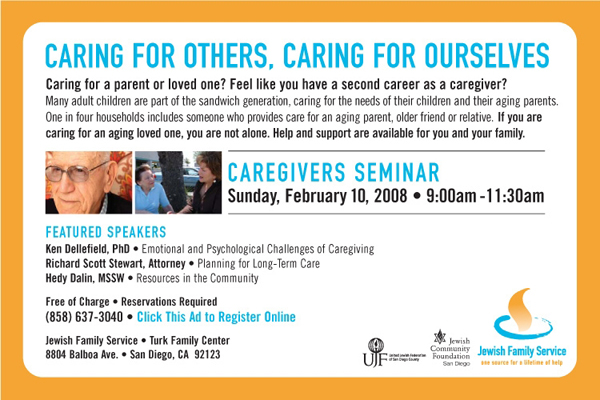
Jerusalem Diaries
Bush visit shuts down Jerusalem traffic
By Judy Lash Balint
 JERUSALEM—After a rainy, chilly day of protests and rallies in the 24 hours preceding the arrival of U.S. President George W. Bush to Israel, today the skies cleared and normal life in Jerusalem ground to a halt. JERUSALEM—After a rainy, chilly day of protests and rallies in the 24 hours preceding the arrival of U.S. President George W. Bush to Israel, today the skies cleared and normal life in Jerusalem ground to a halt.
All the central streets of Jerusalem, adorned with bright new American and Israeli flags flapping in the wind, were closed to traffic including public transport. Jerusalem is a walker’s city, but for the next 48 hours there was no other way to get around except on foot. Most taxi drivers took off to the Dead Sea on an enforced vacation, since barely any roads were open to drive on.
Judy Lash Balint
While G.W made his way from Ben Gurion airport outside Tel Aviv to Jerusalem on the Marine One helicopter, his entourage of hundreds had taken to the roads, forcing the closure of the main Tel-Aviv-Jerusalem highway.
Most Israeli political commentators are predicting little more than ceremonial results from the first official visit to Israel by G.W. Just hours before Air Force One landed, nine Kassam rockets slammed into southern Israel from Gaza sending a few Sderot residents to the hospital to be treated for shock. Yesterday, two Katyushas landed in the Galilee community of Shlomi—the first such attack in more than 18 months since the Second Lebanon War.
It’s ironic that G.W. stayed in Jerusalem, hosted by the stately King David Hotel. America’s embassy in Israel is firmly ensconced in Tel Aviv, along with the embassies of every other country in the world. The United States, Israel’s greatest friend in the world, still doesn’t recognize Jerusalem as the capital of the Jewish state. Presumably, the lame duck president who became a born again Christian in his 40s allowed his personal understanding of the centrality of Jerusalem to override political and strategic considerations.
Snipers dotedt the roof of the hotel and the surrounding buildings as the massive motorcade, led by seven police motorbikes arrived at the hotel. Jerusalem’s streets were deserted. The fancy art and Judaica stores along King David Street closed down and were covered with opaque blue sheeting. The entryway to the historic hotel had been transformed into a sterile security tunnel, completely covered so that all those entering and leaving the hotel were unseen.
As the entourage poured out of their vehicles in front of the hotel, the Israeli press complained about their lack of access. The only media personnel allowed access to the King David Hotel were the members of the White House press corps. Everyone else was relegated to coverage from the empty streets.
And what about coverage of the demonstrations and rallies? Despite the obvious presence of US consulate types in plainclothes who must have included a rundown of the protests complete with crowd estimates in their reports to Washington, media coverage was minimal, given the size and intensity of the demonstrations.
Whether it was the renaming of Paris Square to Jonathan Pollard Square; or the symbolic hug around the walls of the Old City by thousands of exuberant students and proponents of a united Jerusalem; or the mud-soaked evening rally at Har Homa by another thousand hardy souls dedicated to Israel’s right to build Jewish neighborhoods inside her capital—none of these efforts succeeded in getting much air time.
For a moving first-hand report from the Old City rally, see the report of my rabbi Ian Pear.
Meantime, G.W would see little more than the sterilized streets of Jerusalem before he headed off to Ramallah todayfor a pow-wow with Palestinian leaders. Stay tuned.
.

President Bush should see Sderot
By Bruce Kesler
ENCINITAS, California —Israel Matzov’s blog raises an interesting point about President Bush’s itinerary in Israel:
It's a shame they didn't substitute a trip to Sderot for Yad Vashem. When you take foreign dignitaries to Yad Vashem, it's because they need to be shown what can happen. God forbid, if there is no place for Jews to go. I don't think Bush needs that. I think he - and Israel - would have gotten a lot more out of a trip to Sderot.
President Bush could see the impact of these Kassam missiles fired into Sderot from Gaza:
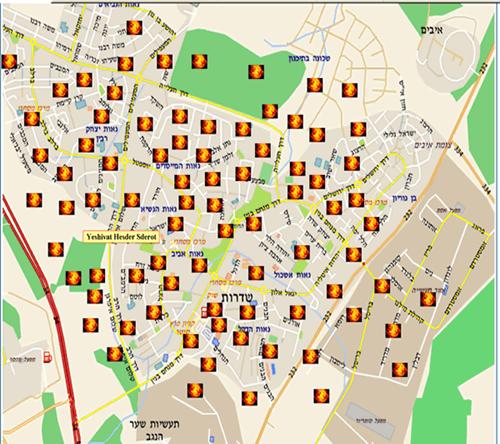
Meanwhile, Mahatma Gandhi’s grandson is given prominence in the Washington Post to argue that Jews are too attached to their history of being exterminated:
How can anyone live peacefully in such an atmosphere? Would it not be better to befriend those who hate you? Can you not reach out and share your technological advancement with your neighbors and build a relationship?
Apparently, in the modern world, so determined to live by the bomb, this is an alien concept. You don't befriend anyone, you dominate them. We have created a culture of violence (Israel and the Jews are the biggest players) and that Culture of Violence is eventually going to destroy humanity.
He’s consistent with his grandfather, who counseled Europe to lay down before the Nazis and, even after the war, his counsel to Jews that, “…suffering voluntarily undergone will bring [Jews] an inner strength and joy…”
That may win some plaudits among some few noble minds, but more likely among the many of evil minds and deeds. The Holocaust is not just a memory. It is a current reality in their intent and capabilities. It wasn’t and will not be prevented by pandering to those determined to horrendous acts.



But if Iraq has moved toward relative security, the stability is extremely fragile and requires more than just American and coalition support. It requires the active participation of Egypt and the Gulf States, led by Saudi Arabia. As President Bush goes to the region, it is imperative that he talk to them about returning their diplomatic personnel to Baghdad and providing debt relief to Saddam's successors. The Gulf States can afford it and there should be at least one benefit to the current price of oil.
Right now, the President is in a strong position.
The Sunni-majority Arab states - led by Saudi Arabia - were unhappy with the overthrow of Saddam for three important reasons: Saddam's army held Shiite fundamentalist Iran in check; they feared Iraq's Shiite majority would take revenge on the Sunnis for the depredations of Saddam's rule; and they believed a Shiite-Arab-led government in Iraq would be more Shiite than Arab, bending toward Persian Iran rather than the Arab fold.
While their fears were legitimate - particularly their fear of Iranian expansionism - their response was counterproductive in the extreme: funding and supporting al Qaeda and Sunni radicals in hopes of restoring Sunni rule, refusing to recognize the elected government, and refusing debt relief.
Over the past year, the United States, by design enhanced by coincidence, has averted at least for now the feared Iraqi civil war and helped the Sunnis begin to find their place in the new Iraq. The Shiites have shown some independence from Iran, but it's awfully hard to encourage them to see themselves as Arab Iraqis first and as Shiites second if the only regional diplomatic presence in Baghdad is from TEHRAN. Iran is spending money, sending arms and expanding its influence among the Shiites and there is no countervailing Arab presence or help.
The Arabs are not only ceding the playing field, but also enhancing Iran's position. They have the money, they have the capability, and they have the right instincts on this - Iran has to be reduced in influence. President Bush has been undermined at the strategic level by the NIE on Iran, but one of the surest lessons of Iraq is that tactical successes can pave the way for strategic ones.
The Arab states have to bring their influence, their diplomats and their money to Baghdad - in their own interest - and the President should make the case.

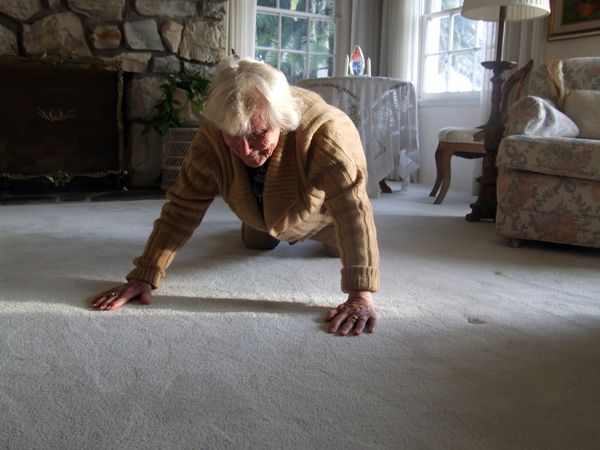
THE JEWISH CITIZEN 'A Jewish Story Everywhere'
Cecelia Kipperman is a Coronado 'legend'
By Donald H. Harrison
 CORONADO, California—At age 94, Cecelia Kipperman doesn't have her red hair anymore but she still has all her spunk. She proved that to me, at the end of an interview, when I kiddingly expressed skepticism over her claim that she still could do ten pushups and other exercises without raising a sweat. CORONADO, California—At age 94, Cecelia Kipperman doesn't have her red hair anymore but she still has all her spunk. She proved that to me, at the end of an interview, when I kiddingly expressed skepticism over her claim that she still could do ten pushups and other exercises without raising a sweat.
"Give me ten!" I said in my best imitation of a Marine Corps drill sergeant. Down on the carpet of her home she went. "Are... these... pushups.. or...not?" she asked, knocking off five while my mouth still was dropping.
Donald H. Harrison
In the 60 years that Kipperman has lived in Coronado, since opening Kippy's dress store in 1948 with her late husband Lew, she has become one of the better-known residents of this small residential city across the San Diego-Coronado Bay Bridge from San Diego. Her son, Bob, who succeeded his parents in the dress business, asserts that in Coronado, "there's nobody who doesn't know her, there's nobody whose life she hasn't touched."
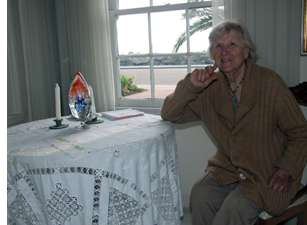 Another son, Doug, an art teacher at San Diego Jewish Academy, explains that his mother has a knack for helpfully interceding in people's lives. "She does the little things," he said. "She listens, she's non-judgmental. I don't know if she goes out of her way to do it, but if there is someone who needs a job, or someone who needs a place to live, she makes connections. You've heard of the six degrees of separation (between any two people)? She bridges it in three. She makes some phone calls and all of a sudden the problem is solved." Another son, Doug, an art teacher at San Diego Jewish Academy, explains that his mother has a knack for helpfully interceding in people's lives. "She does the little things," he said. "She listens, she's non-judgmental. I don't know if she goes out of her way to do it, but if there is someone who needs a job, or someone who needs a place to live, she makes connections. You've heard of the six degrees of separation (between any two people)? She bridges it in three. She makes some phone calls and all of a sudden the problem is solved."
While being helpful to others may be "insignificant compared to the cure of cancer," Doug Kipperman continues, "it is monumental in an individual's life at the moment."
Last year, the local chapter of Soroptomists International honored Kipperman as one of Coronado's most legendary women. "I don't know why they honored me," she reflected. "They just think I am a good person, not for anything special. I am not a big donor. We are not big money people. We live modestly.."
Her father was a tailor, who had immigrated to the United States from Belarus. The Depression hit his business hard, and one day in 1930 she was sitting outside his shop in North Plainfield, N.J., when, according to Kipperman, "Mrs. Ginzburg, very elegant, from the Reform temple walked by and said, 'Cecelia, where are you going to college this year?' and I said, 'I am not going to college; I don't have funds.'
"We talked a little bit and she walked away and the next thing I know, she went to the high school and started a rummage sale and earned $250. She came to me and said, 'I have $250, you can borrow it and pay it back in ten years without interest and I have $50 from the Council of Jewish Women as a gift.' I went off to college with that...when I was 17 years old."
At Rider College in New Jersey's state capital city of Trenton, one of her teachers, Emily Daw, noticed that Cecelia was existing on a diet of buttermilk, because she had so little money for food. "So she invited me to her house for dinner and I ate meals at her house quite often. She noticed that I scratched my leg and she figured it was hives and sent me to a doctor."
But one day there was a note on the door that her mentor couldn't make it home in time for dinner, so Cecelia went to one of the finest restaurants in town, the Broadway Inn, where she only had enough money to order two hotdogs and a side dish for dinner. But she struck up a conversation with the receptionist, commenting that the daily typed menu "needed a little help." The receptionist called the owners of the restaurant, Mr. Seiden and Mr. Finkel, and one of them said if Cecelia would type up the menus neatly for them, they would allow her to eat three meals a day there. "So I got to eat with all the big shots," Kipperman recalled. Among regular customers were H. Norman Schwarzkopf, the organizer of the New Jersey State Police and father of future Army General Norman Schwarzkopf, hero of the first Iraq War. Another was former New Jersey Gov Edward Casper Stokes.
She visited the state Capitol often, one time advising an older man to be sure to be careful on the bottom step, which was a bit slippery. According to her son Doug, who had heard the story many times over the years, the man was impressed by her caring attitude, and commented: "No one has ever said that to me!" He suggested that she take the state's Civil Service exam, promising her that no matter how she scored on the test, there would be a government job waiting for her. The man turned out to be the state finance commissioner of New Jersey, and he need not have worried about how she would score. Kipperman was graduated from the college summa cum laude.
In Daw's English class, Cecelia Estrin met her future husband, Lew Kipperman. She sat in the front row, he sat in the back row, but they often would talk to each other before class. Daw, serving as a Presbyterian shadchan to the Jewish couple, suggested that they both sit in the middle row, as it would be less disruptive to the class.
After they were married, Lew worked for department stores, learning the clothing business, and Cecelia worked at the state Capitol at a variety of jobs, including typing New Jersey Supreme Court decisions.
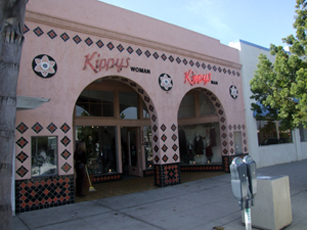 Her asthma prompted the move to Coronado in 1948, after the couple spotted in the Wall Street Journal an advertisement for a dress shop on Orange Avenue, the city's main thoroughfare. It turned out the store's owners did not keep up on fashion and their stock consisted of pre-World War II clothing, all with buttons and none wit zippers. The Kippermans gave all the clothing away, changed the name of the store to Kippy's, obtained merchandise through Lew's department store contacts, and began their lives in Coronado. Two of the old employees, not willing to work for Jews, quit. On the first day, the Kippermans' total receipts came to $5.12, including taxes. Her asthma prompted the move to Coronado in 1948, after the couple spotted in the Wall Street Journal an advertisement for a dress shop on Orange Avenue, the city's main thoroughfare. It turned out the store's owners did not keep up on fashion and their stock consisted of pre-World War II clothing, all with buttons and none wit zippers. The Kippermans gave all the clothing away, changed the name of the store to Kippy's, obtained merchandise through Lew's department store contacts, and began their lives in Coronado. Two of the old employees, not willing to work for Jews, quit. On the first day, the Kippermans' total receipts came to $5.12, including taxes.
It took awhile to overcome the reputation of the previous store, but gradually through word of mouth, the store developed a customer base that was based half on local residents and half on guests at the nearby Hotel del Coronado, where the family purchased a $50-a-year membership, allowing the Kipperman boys--Bob, Dick (a bankruptcy court trustee) and Doug--to practically grow up at the resort hotel.
One of Kipperman's earliest San Diego memories was attending a service in May of 1948 at Congregation Beth Israel at Third and Laurel Streets when Rabbi Morton Cohn announced that Israel formally had been declared an independent nation by David Ben-Gurion.
Other Coronado residents liked to leave their community as infrequently as possible, so they often asked the Kippermans to pick out some clothes for them on their buying trips to Los Angeles, Kipperman recalled.
"I have the ability to size up a customer and know what would be good on her; that was one of my plusses," she added. "When somebody came in, I would mentally see her as she would like to be seen, and I could find clothes to fit her. I just had that knack; I had it since I was a kid.... I don't see me, I always see the customer. I don't buy for me."
When a woman walked into the shop, "first of all I welcomed her and said something to break the ice. Maybe it was 'a great day today' or 'isn't it a pretty day today?' and then I would give her a little time to wander around. And then I'd say, 'Are you looking for something special?" and she might say 'I'd like to have a red dress,' and we wouldn't have a red dress, but I would say 'let me show what I have.' I'd show her a black dress, because I would look at her and I would see her in a black dress. This is just something I have a knack for. I'd say 'let's try this on.' You have to get her into the dressing room, and when you have her undressed, she is open for almost anything." Kipperman estimated that she made 4 out of 5 sales this way. "I visualize a customer the way I would a picture in a frame," she said.
Proximity to the Hotel del Coronado resulted in many celebrities coming in. When actor Van Johnson and his wife came in, "I learned that she was giving her kids cod liver oil," Kipperman said. "While we were talking, she would try on clothes." Rosalind Russell's family became so friendly with the Kippermans that her son took one of Kipperman's sons to dinner in Mexico.
While Cecelia ran the shop, Lew became involved in civic affairs, serving on the Chamber of Commerce, Kiwanis, Red Cross, the hospital board. She developed a natural ease with people, never hesitating to approach people who might be intimidating to others.
On a trip to Italy, for example, the couple spotted the Duke and Duchess of Windsor. Before he became King of England and then abdicated his throne "for the woman I love," the Duke--then the Prince of Wales--had been feted at the Hotel del Coronado. Wallis Simpson had lived in Coronado, while the wife of a Navy captain. Publicists for the hotel later encouraged the rumor that the couple had met there. They hadn't, but Coronado nevertheless was part of their past.
"Do you remember Coronado?" Kipperman said as she approached the duchess in Venice. "Quite fondly," the duchess responded, inviting Kipperman to join her at her table. Kipperman and the Duchess of Windsor chatted about Coronado as Lew and a son swam nearby with the Duke.
On another trip, the Kippermans went to the Apollo Theatre in Harlem. As the only white couple present, they wondered what kind of seats they would get. As it turned out, they were placed by the maitre d' next to band leader Cab Calloway and his family. Before long, they were included in the family celebration. The Kippermans were married 69 years prior to Lew's death in 2003.
"There was never a time that she couldn't talk to somebody and discover their deepest, darkest secrets," Doug Kipperman said of his mother. "She could get anyone to talk. It was her chutzpah in a way, not chutzpah really because it's seductive. My mother's charm is that she is disarming and she is interested in people and she cares enough to ask questions. People feel comfortable telling her things."
Kipperman harkens to kindnesses that other people paid her during her high school and college years. Customers of the dress shop knew that she and her husband would respond to any emergency. There was a pregnant Navy wife, who banged at the door of their home after 6 p.m. in a panic because she was going to a dance and nothing fit anymore. They opened up and found a dress that looked good on her. There was the woman who lacked self confidence being interviewed for a job. Kipperman encouraged her, and the woman ended up becoming one of the town's librarians for 20 years. The list of individuals who she made her cause could go on and on.
She also spearheaded a drive to build the convalescent wing at Coronado Hospital, was instrumental in helping to win approval for a senior center, was named woman of the year by the local business women's and professional club, served on the board of the cancer society, and received the "good egg" award from the Coronado Rotary Club.
Although she says she is not religious, Kipperman's latest cause is helping Chabad establish a new center in Coronado. Rabbi Eli Fradkin, the young son of Rabbi Yonah Fradkin, director of Chabad for San Diego County, has slowly been making headway in introducing Chasidic Judaism to the conservative community.
Meanwhile, the Agency for Jewish Education runs a regular series of lectures at the Coronado Library, and a Jewish women's group, of which Kipperman is a member, meets regularly to discuss books, opera and other cultural subjects.
Besides with aerobics and those push ups, Kipperman keeps fit by walking along the beach in front of her home, as often as not striking up conversations with passersby. Coronado, she says, "is fairyland. This is the most wonderful place to raise children, a wonderful place to live. We are blessed with good weather, even when everyone else is having bad weather. The people are all friendly. If you walk down the street, the all say hello to you. It hasn't changed in that respect.... A doctor that I met in Coronado, who came from San Diego, told me 'I am so surprised: my patients are ten years younger than their real age here in Coronado than they are in San Diego."
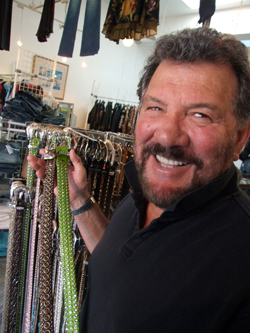 Eventually, Lew and Cecelia Kipperman turned Kippy's over to Bob, who expanded it to six stores before tragedy, in the form of a traffic accident, struck in the 1980s. Bob was walking across the street on the 4th of July when he was hit by a car. "I suffered a head injury and I was like a person who had a stroke, I couldn't use words," Bob recalled. "I was non verbal for almost a year and a half." He still had function of his hands, however, and to occupy himself he started making studded women's belts. Eventually, Lew and Cecelia Kipperman turned Kippy's over to Bob, who expanded it to six stores before tragedy, in the form of a traffic accident, struck in the 1980s. Bob was walking across the street on the 4th of July when he was hit by a car. "I suffered a head injury and I was like a person who had a stroke, I couldn't use words," Bob recalled. "I was non verbal for almost a year and a half." He still had function of his hands, however, and to occupy himself he started making studded women's belts.
His inability to talk put Bob Kipperman into serious debt and forced the closure of all the stores except the original one in Coronado. However, the belts became popular not only at his store, but at other fashionable stores including Theodore on Rodeo Drive in Beverly Hills. A friend who owned that store placed an initial order for $12,000 worth of belts, and within a short time ordered $8,000 more. Bob called on his contacts in the fashion industry and soon Kippy's belts—now
manufactured at a bodega on the San Diego side of the Coronado bridge—were being sold in fine women's stores around the United States. Like his father before him, Bob has been active in Coronado civic affairs, serving on the city's Design Review Committee.
Meanwhile, Cecelia Kipperman was not at all interested in retirement. Just shy of her 70th birthday, she started a new career as director of vocational education as well as the regional occupational program at Coronado High School. She kept at it for another ten years, and then at 80, continued to work regularly as a substitute teacher. She still guest teaches in Coronado and in Imperial Beach, and says being a workaholic, she would gladly look for another part-time or full-time job if age hadn't taken its toll on her hearing and vision.
Said son Bob, looking forward to her 95th birthday in March: "She still has more energy than I do, and a busier social schedule than I do."
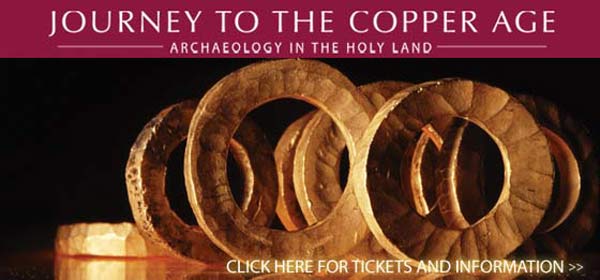


SAN DIEGO JEWISH WORLD THE WEEK IN REVIEW
Donald H. Harrison in San Diego: He'll whup you but not until after sundown
Ira Sharkansky in Jerusalem: Olmerts 'illegal settlement' problem
Shoshana BryenDonald H. Harrison Charly Jaffe in San Diego: We worry if we will be accepted to a good college;
they worry if they'll be alive through high school
Shoshana Bryen in Washington, D.C.: A briefing for President George W. Bush
Donald H. Harrison in San Diego: Documentary enlarges upon the work of New Zealand photographer Friedlander
Sheila Orysiek in San Diego: Paroxysm - the National Election Begins
Ira Sharkansky in Jerusalem: Pay no heed to ' junk' on the internet
Shoshana Bryen in Washington, D.C.: Salute to retiring Jewish chair of the House Foreign Relations Committee
Donald H. Harrison in Lemon Grove, California: Lemon Grove: For Jews, there are some sour facts and sweet memories
< BACK TO TOP
|
|

